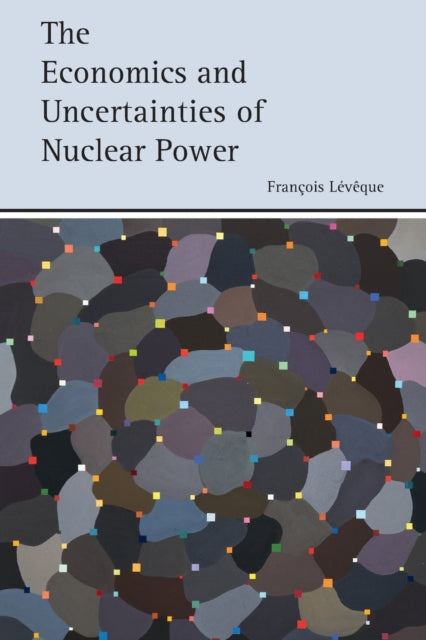Francois Leveque
The Economics and Uncertainties of Nuclear Power
The Economics and Uncertainties of Nuclear Power
YOU SAVE £1.34
- Condition: Brand new
- UK Delivery times: Usually arrives within 2 - 3 working days
- UK Shipping: Fee starts at £2.39. Subject to product weight & dimension
Bulk ordering. Want 15 or more copies? Get a personalised quote and bigger discounts. Learn more about bulk orders.
Couldn't load pickup availability
- More about The Economics and Uncertainties of Nuclear Power
This book provides an economic analysis of the main controversies surrounding nuclear power, helping readers gain a better understanding of the uncertainties surrounding the costs, hazards, regulation and politics of nuclear power. It is an important resource for students, researchers, energy professionals, and concerned citizens.
Format: Paperback / softback
Length: 349 pages
Publication date: 27 January 2022
Publisher: Cambridge University Press
Nuclear power has been a topic of debate for many years, with opinions varying widely on its future. Some argue that it is a thing of the past, while others believe that it is a technology for the future. However, the cost and safety of nuclear power have been major concerns for many people.
On the one hand, nuclear power plants are known for their high efficiency and low emissions, making them a potential source of clean energy. They can produce large amounts of electricity without emitting greenhouse gases, which can help mitigate climate change. Additionally, nuclear power plants are relatively cheap to operate compared to other forms of energy generation, such as wind or solar power.
On the other hand, nuclear power plants are also associated with significant risks and hazards. One of the biggest concerns is the potential for a major nuclear accident, which could cause widespread damage and loss of life. Nuclear accidents can be caused by a variety of factors, including human error, equipment failure, and natural disasters. In addition, the disposal of nuclear waste is a major concern, as it can remain dangerous for thousands of years and can be difficult and expensive to manage.
Another issue with nuclear power is the regulation of the industry. Many countries have strict regulations in place to ensure the safety and security of nuclear power plants, but there have been instances of regulatory lapses and accidents in the past. This has led to concerns about the ability of governments to effectively regulate the industry and prevent accidents.
In terms of cost, nuclear power can be expensive to build and operate. The construction of a nuclear power plant can cost billions of dollars, and the ongoing costs of operating and maintaining the plant can be significant. Additionally, the costs of decommissioning a nuclear power plant and managing nuclear waste can be substantial.
Despite these concerns, some argue that nuclear power is still a competitive and sufficiently safe option for generating electricity. They argue that the risks and hazards of nuclear power are outweighed by the benefits of clean energy and low emissions. Additionally, they argue that emerging countries, which have significant energy needs and limited resources, should invest in nuclear power as a way to meet their energy needs and reduce their dependence on fossil fuels.
However, others argue that nuclear power is too expensive and dangerous to invest in. They argue that the risks and hazards of nuclear power are not worth the potential benefits, and that there are other, safer and more cost-effective ways to generate electricity. Additionally, they argue that emerging countries should focus on developing renewable energy sources, such as wind or solar power, rather than investing in nuclear power.
In conclusion, nuclear power has been a topic of debate for many years, with opinions varying widely on its future. While nuclear power plants are known for their high efficiency and low emissions, they are also associated with significant risks and hazards. The cost and safety of nuclear power have been major concerns for many people, and the regulation of the industry is a significant issue. However, some argue that nuclear power is still a competitive and sufficiently safe option for generating electricity, while others argue that it is too expensive and dangerous to invest in. Ultimately, the decision about whether to invest in nuclear power should be based on a careful consideration of the risks and benefits, as well as the specific circumstances of each country.
Weight: 510g
Dimension: 152 x 229 x 23 (mm)
ISBN-13: 9781107455498
This item can be found in:
UK and International shipping information
UK and International shipping information
UK Delivery and returns information:
- Delivery within 2 - 3 days when ordering in the UK.
- Shipping fee for UK customers from £2.39. Fully tracked shipping service available.
- Returns policy: Return within 30 days of receipt for full refund.
International deliveries:
Shulph Ink now ships to Australia, Belgium, Canada, France, Germany, Ireland, Italy, India, Luxembourg Saudi Arabia, Singapore, Spain, Netherlands, New Zealand, United Arab Emirates, United States of America.
- Delivery times: within 5 - 10 days for international orders.
- Shipping fee: charges vary for overseas orders. Only tracked services are available for most international orders. Some countries have untracked shipping options.
- Customs charges: If ordering to addresses outside the United Kingdom, you may or may not incur additional customs and duties fees during local delivery.


